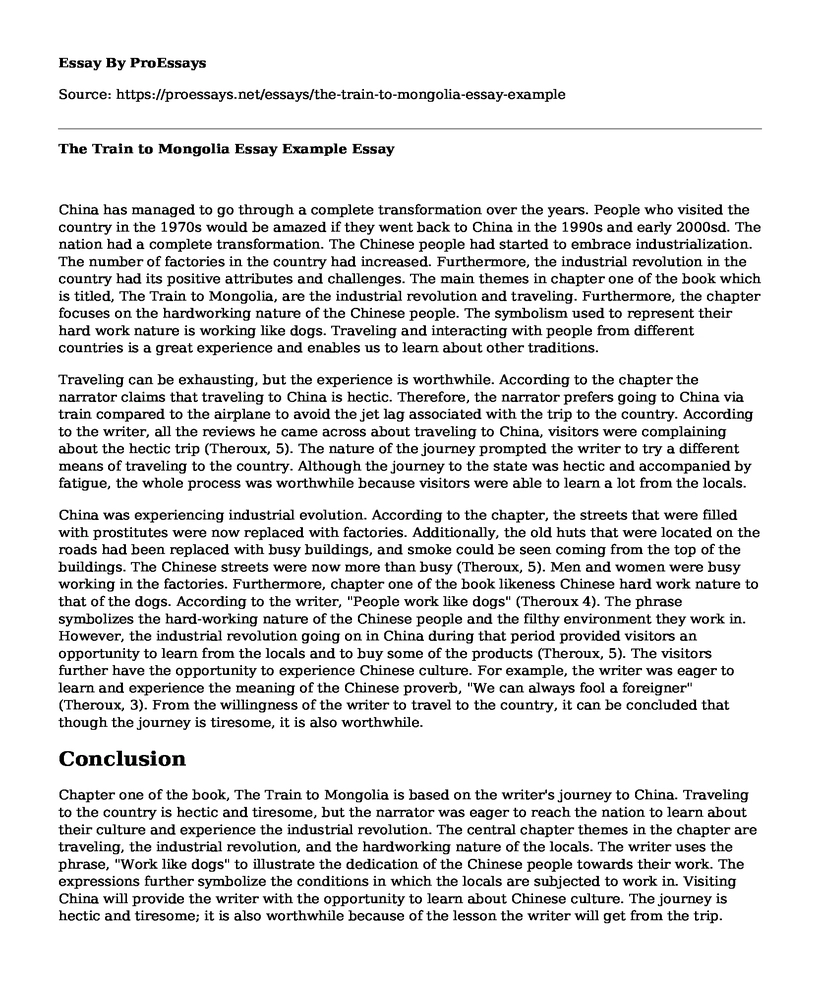China has managed to go through a complete transformation over the years. People who visited the country in the 1970s would be amazed if they went back to China in the 1990s and early 2000sd. The nation had a complete transformation. The Chinese people had started to embrace industrialization. The number of factories in the country had increased. Furthermore, the industrial revolution in the country had its positive attributes and challenges. The main themes in chapter one of the book which is titled, The Train to Mongolia, are the industrial revolution and traveling. Furthermore, the chapter focuses on the hardworking nature of the Chinese people. The symbolism used to represent their hard work nature is working like dogs. Traveling and interacting with people from different countries is a great experience and enables us to learn about other traditions.
Traveling can be exhausting, but the experience is worthwhile. According to the chapter the narrator claims that traveling to China is hectic. Therefore, the narrator prefers going to China via train compared to the airplane to avoid the jet lag associated with the trip to the country. According to the writer, all the reviews he came across about traveling to China, visitors were complaining about the hectic trip (Theroux, 5). The nature of the journey prompted the writer to try a different means of traveling to the country. Although the journey to the state was hectic and accompanied by fatigue, the whole process was worthwhile because visitors were able to learn a lot from the locals.
China was experiencing industrial evolution. According to the chapter, the streets that were filled with prostitutes were now replaced with factories. Additionally, the old huts that were located on the roads had been replaced with busy buildings, and smoke could be seen coming from the top of the buildings. The Chinese streets were now more than busy (Theroux, 5). Men and women were busy working in the factories. Furthermore, chapter one of the book likeness Chinese hard work nature to that of the dogs. According to the writer, "People work like dogs" (Theroux 4). The phrase symbolizes the hard-working nature of the Chinese people and the filthy environment they work in. However, the industrial revolution going on in China during that period provided visitors an opportunity to learn from the locals and to buy some of the products (Theroux, 5). The visitors further have the opportunity to experience Chinese culture. For example, the writer was eager to learn and experience the meaning of the Chinese proverb, "We can always fool a foreigner" (Theroux, 3). From the willingness of the writer to travel to the country, it can be concluded that though the journey is tiresome, it is also worthwhile.
Conclusion
Chapter one of the book, The Train to Mongolia is based on the writer's journey to China. Traveling to the country is hectic and tiresome, but the narrator was eager to reach the nation to learn about their culture and experience the industrial revolution. The central chapter themes in the chapter are traveling, the industrial revolution, and the hardworking nature of the locals. The writer uses the phrase, "Work like dogs" to illustrate the dedication of the Chinese people towards their work. The expressions further symbolize the conditions in which the locals are subjected to work in. Visiting China will provide the writer with the opportunity to learn about Chinese culture. The journey is hectic and tiresome; it is also worthwhile because of the lesson the writer will get from the trip.
Works Cited
Theroux, Paul. Riding the iron rooster: By train through China. Houghton Mifflin Harcourt, 2006.
Cite this page
The Train to Mongolia Essay Example. (2022, Oct 23). Retrieved from https://proessays.net/essays/the-train-to-mongolia-essay-example
If you are the original author of this essay and no longer wish to have it published on the ProEssays website, please click below to request its removal:
- Communication With Parents Is Very Important After You Move Out
- New World Traditions and Slavery Paper Example
- Essay Example on Egypt's Changing Role in MENA: The Rise of Saudi Arabia
- Essay Sample on Roaring '20s: A Decade of Growth & Change in America & Beyond
- Paper Example on Trade, Politics, and the Great Game: The Eastern Question Explored
- Paper Example on Women's Marches: A Historic Day of Feminist Unity
- Addressing Education Funding Challenges in Longview, Texas: A Call for Reform - Free Essay







